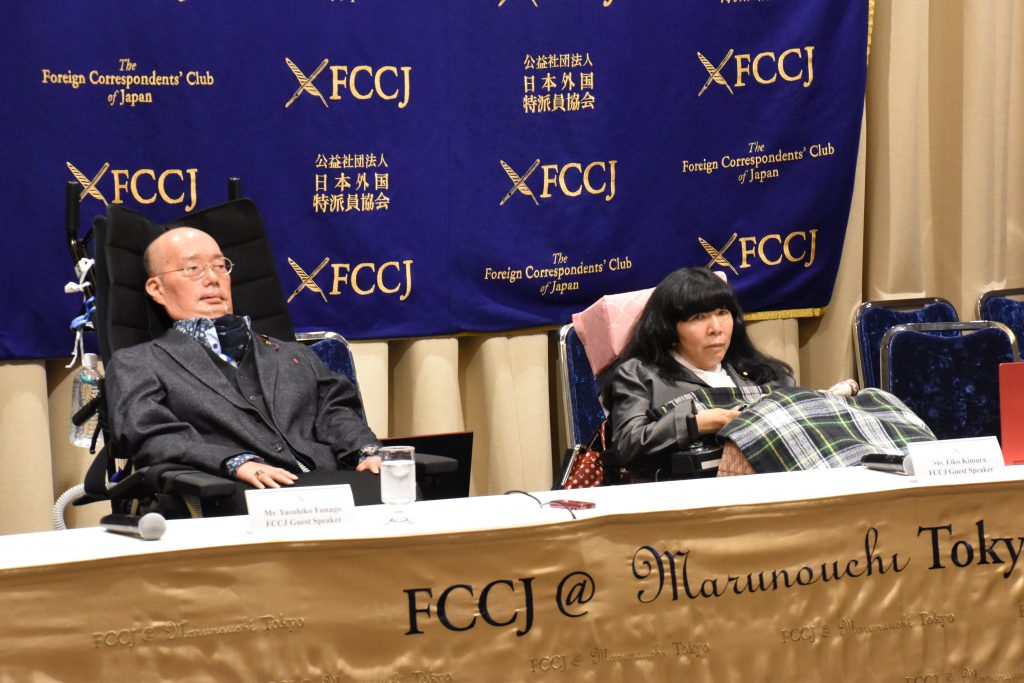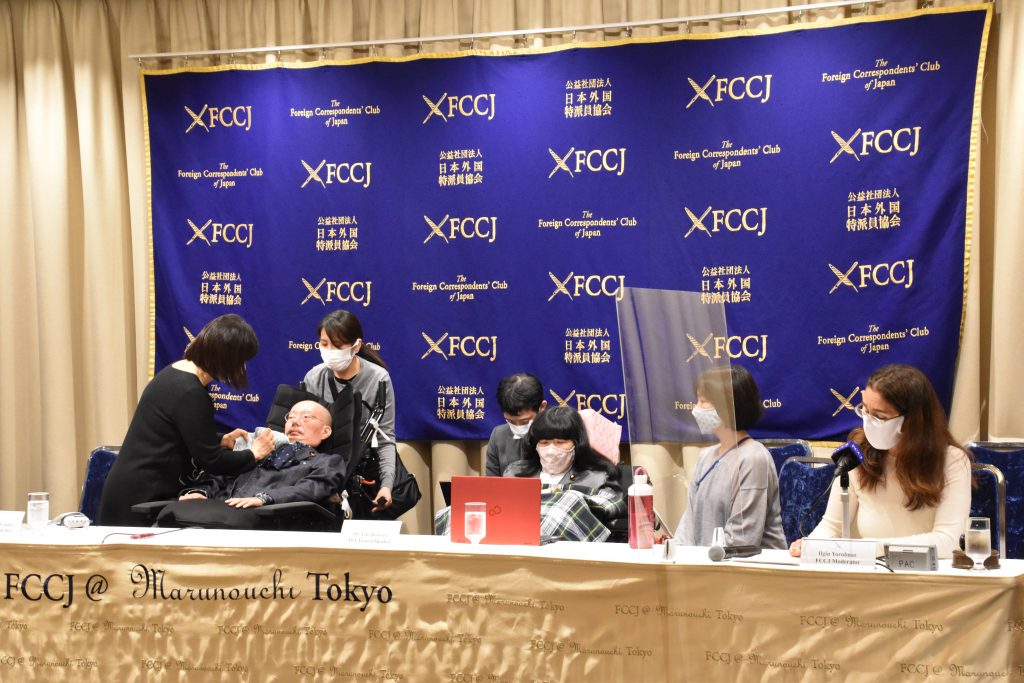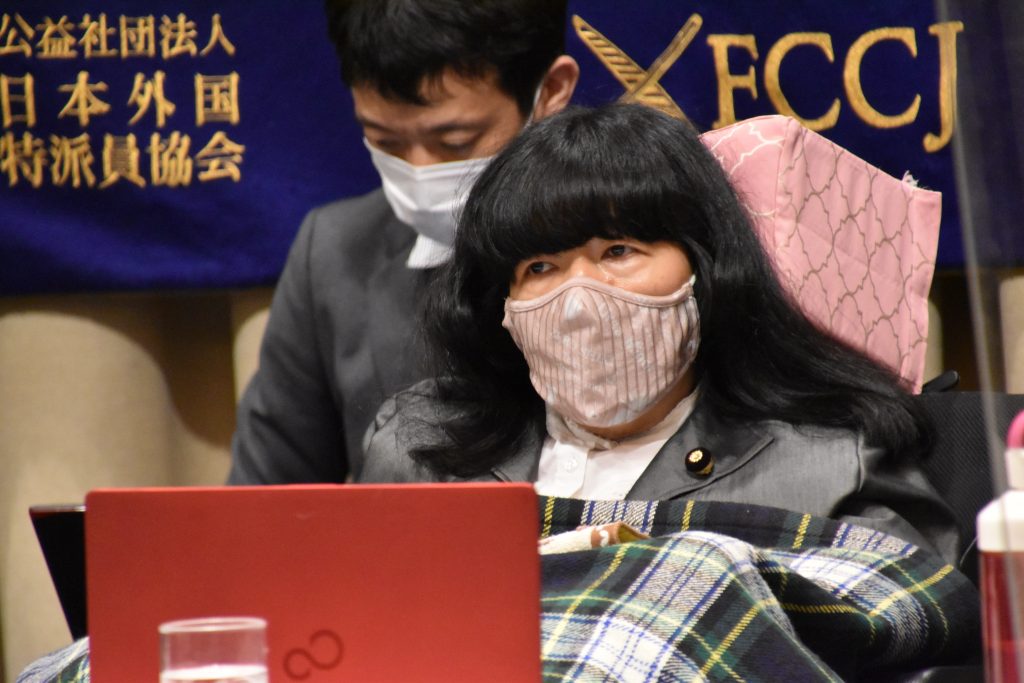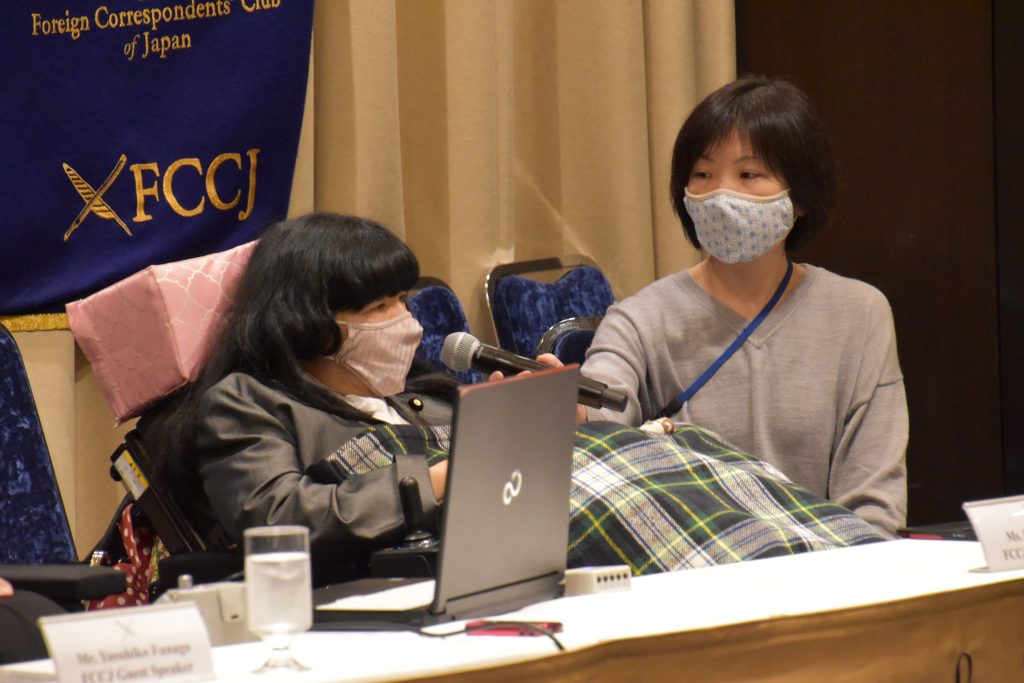昨年12月3日、外国特派員協会でおこなわれた記者会見冒頭スピーチの内容です。




れいわ新選組の木村英子です。私が、国会議員になったわけをお話しします。
私は、生後8か月の時にしょうがいを負い、幼少期のほとんどを親から離れ、施設と養護学校で育ちました。子供の頃の施設では、リハビリと手術を繰り返す毎日で、日常的に職員からの虐待も受けてきました。介護の必要な重度しょうがいしゃは、養護学校を卒業しても、親が介護をできない場合は、ほとんどが施設に入れられてしまいます。
私も例外ではなく、卒業後、次に入る施設が決まっていましたが、たび重なる虐待や施設での隔離生活に耐えられず、親や教師のすすめる施設には絶対に行きたくはありませんでした。
そんなとき、同じく重度しょうがいしゃで自立して地域で生きているしょうがいしゃの存在を知り、施設を拒絶し、地域へ飛び出していきました。
私が地域に飛び出したときは介護保障の制度はほとんどありませんでしたが、地域に飛び出したしょうがいしゃたちが運動を行い、東京都や国に介護制度を作らせました。
自立と社会参加を健常者と同じように保障してもらうためにできた介護制度で、それが時代とともに変わってきて、今の「重度訪問介護」などの制度になっています。
しかし、この制度は、当時から運用が変わっておらず、居宅内のトイレとか着替えとか入浴しか原則として認められていない制度で、しょうがいしゃの社会参加が制限されている状況です。
今回、私が選挙に当選し、いざ参議院で仕事をしようとしたときも、この制度は就労と就学が認められていない制度であったために、登院すらできず、国会活動が事実上できない状況になってしまいました。
くしくも、私が当選したことがきっかけで、日本のしょうがいしゃが健常者と同じような当たり前の権利、地域での生活とか、就労就学などすべての面において、生きにくい現状が世間に明らかになりました。
しょうがいしゃが地域社会で生きていくために必要な住宅、交通、教育、就労、介護などあらゆる場面において健常者と同じ権利が保障されていない現状がある中、特に私のような常に介護を必要な重度しょうがいしゃにとっては社会参加に欠かす事のできない介護保障が不十分であり、日常生活や就労、就学など今日の日本においては当たり前の権利が、充分に保障されていない現状があるのです。
1981年に国際障害者年に掲げられた「完全参加と平等」の理念を実現していくために、参議院議員として日本のしょうがいしゃに対する社会的バリアを一つ一つ取り除いていく活動をしていくことが、私の役割であると思っています。
Good afternoon everybody. My name is Eiko Kimura and I am a member of Reiwa Shinsengumi. I would like to speak to you today about my path to becoming a member of the Japanese Diet. I had my disability when I was eight months old and I spent most of my early childhood years separated from my parents and being raised in an institution and a school for persons with disabilities. In the institution of my childhood, I spent my days and a repeat of rehabilitation and surgery, also being routinely abused by staff. Most people living with severe disabilities and in need of care are placed in institutions when their parents are unable to provide care for them even after they graduate. I was no exception from this. After graduating, the next facility that I was to enter has already been decided. However, being unable to stand the frequent abuse, and the isolation in the institution. I therefore did not want to go to a facility which was recommended by my parents and teachers.
At that time, when I learned of someone who was living with a severe disability but living independently in the community, I want to also live a life as she was. Therefore, I rejected the institution and ventured out into the community. When I first went out into the community, there was almost no system for care or welfare in place. However, people living with disabilities who have themselves left institutions and ventured out into the community were campaigning, including also for human rights in this movement. Thanks to this campaign, the Tokyo Metropolitan and national governments then implement systems for care. This care system was initially established to ensure that people living with disabilities could enjoy the same level of independence and social participation as those without. This care system was first implemented under the basic act for persons with disabilities. Following this, it changed over time as time progressed to become the current system which is “Judo Homon Kaigo”, visiting care for persons with severe disabilities. However, the operation of this system has not changed over the time which has passed, in principle, all it allows for is care services such as toilets facilities, changing clothes and bathing in the home. However, the social participation of people with disabilities outside of the home is extremely limited. When I was elected last year and attempted to go to work in the house of councilors. This system did not even provide for work or study, therefore I was unable to even attend to the Diet and parliamentary activities were virtually impossible.
By coincidence, my election has made it clear to the public that people with disabilities in Japan have the same rights or the same rights to be taken for granted as those who do not have disabilities, however, the fact that, in regard to for example, living, working and studying in the community, there are various factors which make it extremely difficult*. People with disabilities do not now have the same rights as those without in all aspects of life in a community including housing, transportation, education, employment and nursing care, particularly for people such as myself with severe disabilities who need constant care. The nursing care coverage is essential in order to have social participation is now inadequate. And the right seems families are taken for granted today, such as for daily life employment or schooling are not fully guaranteed for people with disabilities. As a member of the House of councilors I believe that it is my role to work to break down one by one the social barriers to people living with disabilities in Japan. In order to realize the idea of full participation and equality, which was set forth in the International Year of disabled persons in 1981.
* 原文の「くしくも、私が当選したことがきっかけで、日本のしょうがいしゃが健常者と同じような当たり前の権利、地域での生活とか、就労就学などすべての面において、生きにくい現状が世間に明らかになりました」に対し、英訳では、「しょうがいしゃは本来、健常者と同じような当たり前の権利を持っているが、地域での生活や就学就労は困難な状況がある」というニュアンスで訳されています。


